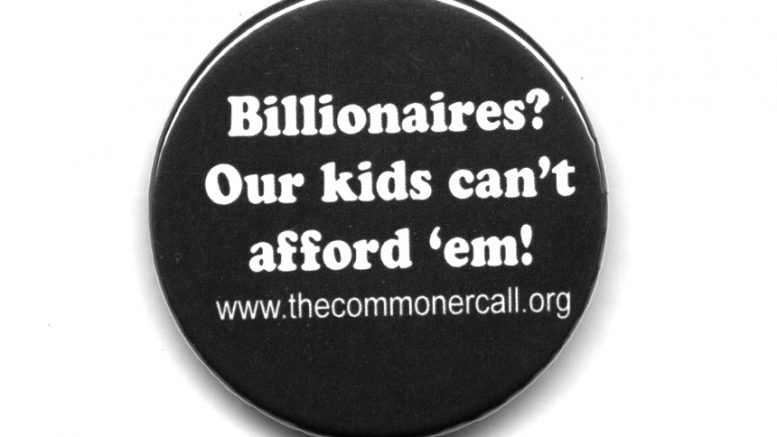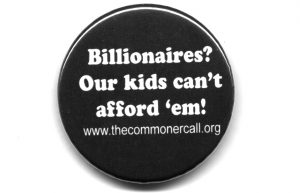The richest 1% own nearly 40% of all the wealth, but pay only 20% of all the taxes.
By Michael Linden
The Guardian (12/13/19)
“Every billionaire is a policy failure.” So says a key adviser to Representative Alexandria Ocasio-Cortez. Ocasio-Cortez herself says that it’s wrong to have a “system that allows billionaires to exist” alongside poverty. And the New York Times columnist Farhad Manjoo recently called for us to “abolish billionaires”.
For most of the last four decades, the gains from economic growth have flowed overwhelmingly to the rich. Much of those gains to the rich weren’t “earned” in any traditional sense, but rather extracted, excess profits squeezed out of a system designed to favor those who already have power, position and wealth. Today, the top 1% of Americans own more wealth than the bottom 90% combined. It’s no wonder “abolishing billionaires” has become a rallying cry.
As of 2016, the wealthiest 1% of American households owned about $27tn in total, an average of about $23m per household. A tax that took about 1% of that wealth each year would yield about $4tn over the next decade.
But what does it really mean? Is it setting a cap on the amount of wealth one household can own? Or does it entail something a little more structural: unrigging the system that gave us billionaires and instead creating an economy in which everyday people get the benefits from the growth that they have created.
Tax justice
Perhaps the most direct way to begin “abolishing billionaires” is by taxing them much more heavily.
America’s overall tax system is only barely progressive – meaning that the richest Americans pay only a bit more in taxes as a share of their income than everyone else. And at the very top, among those taking home hundreds of millions each year, the tax code is actually regressive, meaning the more they make the less they pay. The richest 1% own nearly 40% of all the wealth, but pay only 20% of all the taxes.
Boosting rich people’s taxes is sound policy. Extreme inequality is like economic pollution. It creates widespread harm that the polluters don’t pay for. Inequality makes bubbles more likely, it undermines the foundations for innovation and productivity, and it weakens and destabilizes consumer demand. Taxing it like pollution helps make the costs clearer and reduces the harm.
And of course, taxing the super-rich would generate revenue that could be put to better uses than letting that money sit in a Bahamian bank account of a billionaire.
Over the next 10 years, the richest 1% of American households will take home about another $22tn, after federal taxes. Their average annual post-tax income will be about $1.7m.
Right now they pay about 30% of their income in taxes. Increasing their overall average tax rate by about 10 percentage points would generate roughly $3tn in revenue over the next 10 years, while still leaving the 1% with an average post-tax annual income of more than $1.4m. (That new tax rate, by the way, would be about the same as the overall rate the richest 1% paid back in the 1940s and 1950s.)
Three trillion dollars in new revenue is enough to make college free at all public universities, make a massive new investment in infrastructure along the lines of what Senate Democrats have proposed, and triple the budget for the National Institutes of Health. Needless to say, all of these investments would pay enormous economic dividends.
Of course, we could raise even more from the rich. We could raise the top 1%’s effective tax rate by as much as 25 percentage points and still leave them with an average annual after-tax income of over $1m. Doing that would generate about $8tn in revenue, which …



